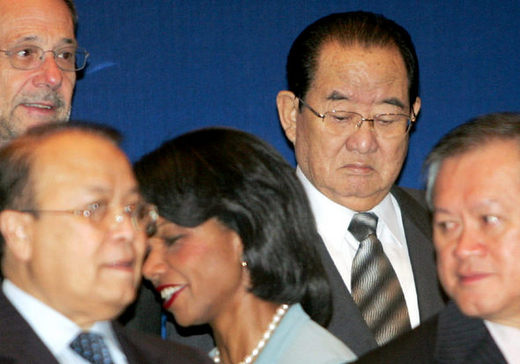 |
|
North Korea's foreign minister Baek Nam-sun casts his glance down at the ASEAN Regional Forum held in Kuala Lumpur, Malaysia, while U.S. secretary of state Condoleezza Rice passes before him. Kuala Lumpur (AP Yonhap News)
|
10-party talks at forum shunned by North
At the 13th Association of South East Asian Nations (ASEAN) Regional Forum, which ended July 28 in Kuala Lumpur, the absence of North Korea at informal 10-nation talks on security issues related to the communist state cast an even darker pall of distrust over relations between Pyongyang and Washington.
Experts were nearly unanimous in saying that forum participants reconfirmed distrust between Pyongyang and Washington because of the North’s refusal to attend the side meeting. There will be an unavoidable cooling-off period, and the North will receive further pressure from the international community, they predicted.
The 10 nations participating in the informal discussion were South Korea, the U.S., Japan, China, Russia, Malaysia, Canada, Australia, New Zealand, and Indonesia.
Professor Kim Yon-chul of Korea University noted that the North should take primary responsibility for the fact that a diplomatic breakthrough was not reached at the ASEAN forum, saying that "the North seems to be playing a game according to past rules. As the Bush administration’s North Korean policies are greatly different from those of Clinton’s, South Korea or China cannot exert their influence like before," he added.
"Under the present situation," Professor Kim continued, "the most serious problem is that the North hasn’t recognized that those rules or the environment have changed. South Korea and China have exerted diplomatic efforts to create the mood for negotiation. In order for such efforts to be effective, Pyongyang should at least return to the six-party talks." Koh Yu-hwan, a Dongguk University professor and expert on North Korea, said that "for Pyongyang, to surrender is like death, therefore it will not come to the negotiating table. At present, the Bush administration does not have a mind to give the North justification [to return to negotiations]. Instead, the United States is gaining strength because Pyongyang was caught in Washington’s trap," referring to the international community’s condemnation of the North’s refusal to join the informal talks. Now, "unless the U.S. makes a concession, there won’t be any resolution," Professor Koh added. Most experts held dim views of future prospects for diplomacy. Professor Kim Ki-jeong of Yonsei University noted that "the U.S. and Japan are likely to make U.N. member nations follow through with its resolution against the North. Confrontation between the international community and North Korea will certainly be escalated over the missile issue." Professor Kim of Korea University said that "it won’t be easy to keep the [diplomatic] momentum going for the time being. If Pyongyang continuously boycotts the six-nation talks, it will bear the entire responsibility for the deadlock." He predicted that "since the U.N. Security Council adopted a resolution, the main contenders are not the North and U.S., but the North and the international community. As a consequence, North Korea’s position has been significantly weakened and the communist regime will likely be put under [further] sanctions." However, Professor Koh said rather optimistically, "If North Korea feels its diplomatic limitations in the international community, the North’s military may learn the reality of international society. Rather than playing another irrational game, it is highly probable that the North will begin to look at the development of matters," taking the long term into consideration, he said.






